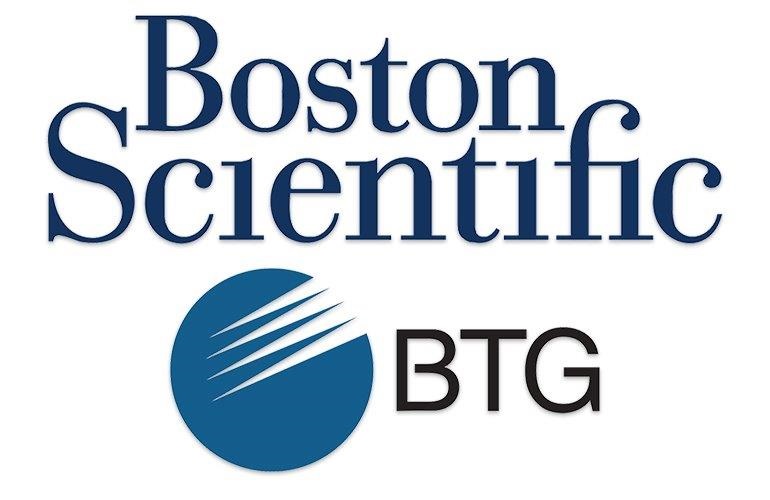Boston Scientific has reached an agreement on the terms of a recommended offer to acquire BTG plc., a United Kingdom-based company that develops and commercializes products used in minimally-invasive procedures, targeting vascular diseases and cancer, as well as acute care pharmaceuticals.
Under the terms of the transaction, holders of BTG’s common shares would receive cash consideration of 840 pence (US$10.79) per share. The total cash consideration for 100% of BTG’s equity is approximately £3.3B, or U.S.$4.2B. The transaction is intended to be affected by way of an English court-sanctioned scheme of arrangement, and is expected to close in the first half of 2019, subject to receipt of required regulatory approvals and the approval of BTG’s shareholders and the U.K. court.
BTG has 1,600 employees globally, located in North America, Europe, Asia and Australia working for three key businesses, the largest of which is its Interventional Medicine portfolio which encompasses several peripheral interventional product lines.
INTERVENTIONAL VASCULAR
The company’s Interventional Medicine business has a highly-differentiated vascular portfolio, including filters, crossing catheters, microfoam and the EKOS Endovascular System.
The EKOS system, in combination with clot-dissolving drugs, breaks down blood clots to restore blood flow in patients with pulmonary emboli, deep vein thrombosis and peripheral arterial occlusions.
It was the first device cleared by the Food and Drug Administration for the treatment of pulmonary embolism – a common complication of hospitalization and a leading cause of preventable hospital deaths.
INTERVENTIONAL ONCOLOGY
The interventional oncology franchise includes the TheraSphere® Y-90 radiotherapy microspheres and the GALIL cryoablation system, used to treat patients with liver, kidney and other cancers.
More than 840,000 people were expected to be diagnosed with liver cancer in 2018, and that number is expected to grow to 1.1 million by 2030.i Kidney cancer is among the 10 most common cancers in both men and women.
PHARMACEUTICAL BUSINESS
The BTG portfolio also includes a pharmaceutical business comprised of acute care antidotes to treat overexposure to certain medications and toxins, and a licensing business that receives royalties relating to products subject to BTG intellectual property and license agreements.
BTG’s interventional medicine products, which use devices to deliver drugs to affected organs, would augment its capabilities in important areas of unmet need such as cancer and pulmonary embolism.
The company has long produced drugs to treat overdoses and rattlesnake bites, has focused on interventional medicine in recent years, for example producing beads that target tumors
BOTH BOARDS ARE HAPPY
The transaction has been unanimously approved by the boards of directors of Boston Scientific and BTG.
“The acquisition of BTG and its rapidly growing peripheral interventional portfolio is an exciting extension of our category leadership strategy that will augment our capabilities in important areas of unmet need such as cancer and pulmonary embolism,” said Mike Mahoney, chairman and chief executive officer, Boston Scientific.
“We are confident that the addition of these therapies to our portfolio will ultimately advance patient care in ways that could not be realized by either company alone, while also allowing us to realize substantial revenue and cost synergies and provide a strong return for investors.”
Louise Makin, chief executive officer of BTG, agreed with Mahoney.
“Boston Scientific shares our commitment to transforming patient care, and has a sustained track record of innovation, clinical expertise and global commercial capabilities,” Makin said.
“The combined organization will be well positioned for success, enabling our valuable products to make a real difference to more people around the world.”
BOSTON SCIENTIFIC SHARES
MAKE 3-YEAR HISTORIC DROP
Boston Scientific has received irrevocable agreements to vote in favor of the transaction from BTG’s three largest shareholders, covering an aggregate of approximately 33 percent of BTG’s outstanding shares, as well as from all of BTG’s directors, who hold an additional 0.3 percent of BTG shares.
Shares of Boston Scientific Corp. fell the most in more than three years Nov. 20 after the medical device company said it would buy BTG, according to Bloomberg.com.
The deal will give Boston Scientific new products for the treatment of cancer and other disorders, but it will add to the company’s debt.
It also likely takes the company out of consideration as a takeover target itself, said Jefferies health-care strategist Jared Holz, who called it a “strange” move by the company.
Boston Scientific “has takeout speculation in shares and thus doing a deal will be a perceived negative as far as the stock is concerned,” Holz said in a note to clients. The shares fell as much as 11 percent, the biggest intraday drop since August 2015. Shares were down 6.1 percent to $33.15 at 9:56 a.m. in New York.
Boston Scientific spokesmen announced that the transaction is expected to be two to three cents accretive to Boston Scientific adjusted earnings per share in 2019, and increasingly accretive thereafter.
On a GAAP basis, the transaction is expected to be dilutive in 2019, and less dilutive or increasingly accretive thereafter, as the case may be, due to amortization expense and acquisition-related net charges
Boston Scientific will fund the transaction with a combination of cash and proceeds from debt financing entered into by.
BTG SHARES SOAR BY A THIRD
The offer, which represents a 50 percent premium to BTG’s 90-day trading average, is a good value for shareholders who have “witnessed a turnaround in BTG and see it develop into an interventional medicine company with a focused approach and growing portfolio,” Adam Barker, an analyst with Shore Capital, said in an email to clients.
Shares of BTG soared by a third to 825 pence (10.60) by noon after touching 832p (10.69), their highest level since Jan. 2015. Up to Monday’s close, they had slipped 19.3 percent this year, despite jumping last week on strong first-half results. VTN




